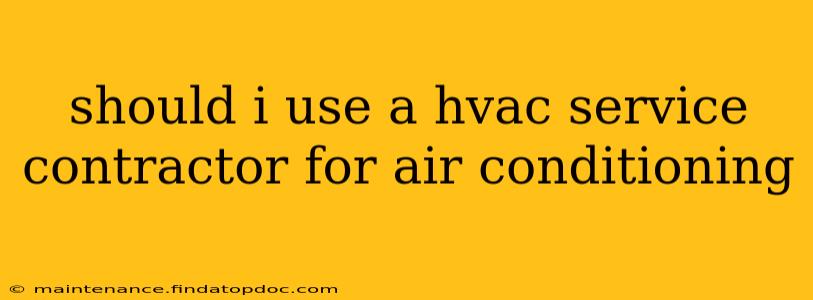Should You Use an HVAC Service Contractor for Air Conditioning?
The short answer is a resounding yes, especially for anything beyond simple maintenance. While you might be tempted to tackle minor air conditioning repairs yourself, relying on a qualified HVAC service contractor offers numerous advantages that far outweigh the potential cost savings of DIY attempts. This article will delve into the reasons why using a professional is the best approach for most air conditioning needs.
What services do HVAC contractors provide for air conditioning?
HVAC contractors handle the full spectrum of air conditioning services, from routine maintenance and repairs to complex installations and replacements. This includes:
- Preventative Maintenance: Regular tune-ups can significantly extend the lifespan of your AC unit, improve efficiency, and prevent costly breakdowns.
- Repairs: From refrigerant leaks and compressor issues to faulty capacitors and electrical problems, HVAC technicians are equipped to diagnose and fix a wide array of AC malfunctions.
- Installation: Whether you're building a new home or replacing an old system, a contractor ensures proper installation, maximizing efficiency and longevity.
- Replacements: When repairs become too expensive or your system is beyond repair, an HVAC contractor can help you select and install a suitable replacement.
- Emergency Services: When your AC fails on a sweltering day, a reliable contractor offers emergency services to get your system back up and running quickly.
What are the risks of not using an HVAC contractor?
Attempting DIY repairs or installations carries significant risks:
- Voiding Warranties: Many AC units come with warranties that are voided if non-certified technicians work on them.
- Safety Hazards: Working with refrigerants and electrical components can be dangerous; improper handling can lead to injury or even death.
- Inefficient Repairs: Incorrect repairs can exacerbate existing problems or create new ones, leading to higher energy bills and further damage.
- Costly Mistakes: A seemingly small mistake can result in costly repairs or even the need for a complete system replacement.
- System Damage: Incorrect installation can lead to reduced efficiency, premature failure, and void warranties.
How can I find a reputable HVAC service contractor?
Finding a trustworthy contractor is crucial. Here's how:
- Check Online Reviews: Websites like Yelp, Google My Business, and Angie's List offer valuable reviews from past customers.
- Ask for References: Reputable contractors will gladly provide references from satisfied clients.
- Verify Licensing and Insurance: Ensure the contractor is properly licensed and insured to protect yourself from liability.
- Get Multiple Quotes: Compare quotes from several contractors to ensure you're getting a fair price.
- Check for NATE Certification: The North American Technician Excellence (NATE) certification signifies a high level of expertise and training.
What are the benefits of using a professional HVAC contractor?
The benefits are numerous:
- Expertise and Experience: Professionals have the knowledge and experience to diagnose and fix problems efficiently and effectively.
- Safety: They understand the safety risks involved and take the necessary precautions.
- Warranty Protection: Using a certified technician helps maintain your warranty coverage.
- Long-term Savings: Preventative maintenance and proper repairs extend the lifespan of your AC system, saving you money in the long run.
- Peace of Mind: Knowing your system is in the hands of a professional provides peace of mind.
What questions should I ask a potential HVAC contractor?
Before hiring, ask about:
- Licensing and Insurance: Verify their credentials.
- Experience with your specific AC system: Ensure they have experience working on your type of unit.
- Warranty on repairs or installations: Inquire about guarantees on their work.
- Pricing structure: Understand how they charge for their services.
- Emergency service availability: Ask about their response time for emergencies.
In conclusion, while seemingly minor AC issues might tempt a DIY approach, the potential risks and long-term costs significantly outweigh any short-term savings. Choosing a qualified HVAC service contractor is a wise investment that ensures the safety, efficiency, and longevity of your air conditioning system. By carefully researching and selecting a reputable contractor, you can enjoy a cool, comfortable home and avoid costly mistakes.
